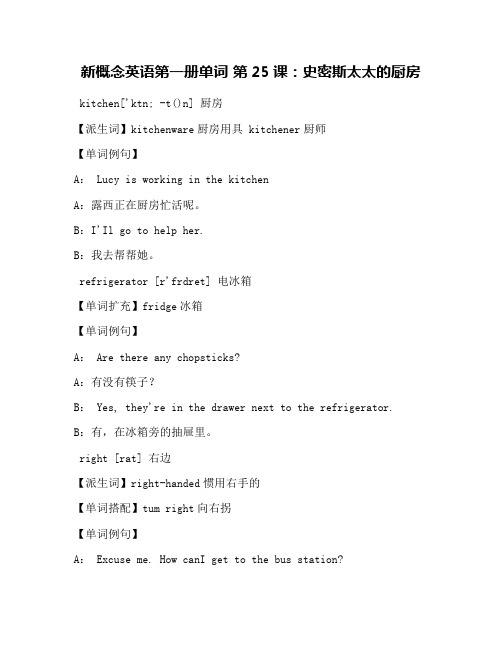新概念第一册25课
- 格式:ppt
- 大小:430.50 KB
- 文档页数:10



新概念英语单词第一册第25课:史密斯太太的厨房kitchen['ktn; -t()n] 厨房【派生词】kitchenware厨房用具 kitchener厨师【单词例句】A: Lucy is working in the kitchenA:露西正在厨房忙活呢。
B:I'Il go to help her.B:我去帮帮她。
refrigerator [r'frdret] 电冰箱【单词扩充】fridge冰箱【单词例句】A: Are there any chopsticks?A:有没有筷子?B: Yes, they're in the drawer next to the refrigerator.B:有,在冰箱旁的抽屉里。
right [rat] 右边【派生词】right-handed惯用右手的【单词搭配】tum right向右拐【单词例句】A: Excuse me. How canI get to the bus station?A:请问,去公共汽车站怎么走?B:Go straight ahead and then take the first turn on the right?B:一直往前走,在第一个拐弯处往右拐。
electric ['lektrk] adj.带电的,可通电的left [left] 左边【单词例句】A: The rest roomls on our lefi. You can get water, tea or coffee at any time there as you like.A:休息室在我们的左侧,随时有开水、茶和咖啡供应。
B: Tbanks. 1'11 get familiar with the envrronment as soon as possible.B:澍谢。
我会尽快熟悉这儿的环境的。
cooker ['kk] 炉子,炊具【单词例句】A: Do you sell cookers here?A:你们这儿卖炊具吗?B: No. you need to go to the supenmuket to get them.B:不卖,你得到超市去买。




新概念一册第25课课文In Lesson 25 of the New Concept English book, we are introduced to a thought-provoking story that explores the role of technology in our lives. This captivating tale raises questions about the potential consequences of our growing dependence on machines. Through vivid imagery and relatable characters, the author invites us to reflect on the delicate balance between progress and the preservation of our humanity.The lesson begins with the narrator's encounter with a shopkeeper who possesses a remarkable machine. This machine is capable of transforming any object into something else entirely. Intrigued by its power, the narrator decides to test its capabilities. He hands the shopkeeper a simple flower, requesting that it be turned into a valuable stone. To his utmost astonishment, the machine successfully completes the task, leaving the narrator in awe of the possibilities that lie ahead.With the newfound knowledge of the machine's abilities, the narrator embarks on a series of experiments, transforming ordinary objects into treasures. Despite the initial excitement, doubts soon arise within him. He begins to question the ethical implications of manipulating the natural world to satisfy human greed and desires. The machine becomes a symbol of human arrogance and the potential destruction that can arise from unchecked advancements.As the story progresses, the narrator's unease grows. He witnesses the gradual decay of society as people become more reliant on the machine. The simplicity and beauty of life are lost, replaced with a constant pursuit of material wealth. The once-thriving markets and shops become barren, aspeople abandon traditional craftsmanship in favor of the machine's instant transformations. The narrator's personal life is also affected, as his loved ones succumb to the machine's allure, neglecting human connection in pursuit of material gain.In the final scene, the machine malfunctions, bringing the narrative to a climactic conclusion. Its abrupt breakdown symbolizes the limits of our reliance on technology and the dangers of forsaking our humanity for convenience. The narrator, now recognizing the detrimental impact of the machine, reflects on the lessons learned and the importance of finding a balance between progress and the preservation of our values.The underlying message of this story is clear – as we embrace technological advancements, we must also safeguard our humanity and the essence of what makes us human. It is a cautionary tale, warning against the blind pursuit of progress at the expense of our intrinsic human qualities. Through powerful storytelling, the author urges us to foster a harmonious coexistence between man and machine, where technology serves as a tool rather than a replacement for our deeply rooted connections to one another and the natural world.Lesson 25 of the New Concept English book leaves readers with a profound reflection on the potential dangers of unbridled technological advancement. The story serves as a reminder to tread carefully, considering the impact of our actions on both ourselves and the world around us. By acknowledging the risks and seeking a balance between progress and human values, we can navigate the path of innovation with wisdom and empathy.This timeless lesson continues to resonate today, as we navigate an ever-evolving landscape of technology and its impact on our lives.。



每课一句:新概念英语第1册第25课【往期回顾】每课一句:新概念英语第1册第23课接下来,我们就来看看第25课的“每课一句”。
一、课文原文Lesson 25 Mrs. Smith’s kitchenMrs. Smith’s kitchen is small.There is a refrigerator in the kitchen.The refrigerator is white.It is on the right.There is an electric cooker in the kitchen.The cooker is blue.It is on the left.There is a table in the middle of the room.There is a bottle on the table.The bottle is empty.There is a cup on the table, too.The cup is clean.——选自《新概念英语》第一册,外语教学与研究出版社,1997年10月第1版二、每课一句There is a refrigerator in the kitchen.There be句型是英语中较为常用的句型。
其基本用法为:There be+人或物+地点该句型表示:在某地有某人或某物其中,be动词的单复数按照就近原则来变化,即be的单复数由它后面离它最近的名词的单复数来决定。
本课侧重的是be作为单数的的用法,即:There is+单数可数名词或不可数名词+地点如:There is a book on the desk.There is some water in the glass.三、更多拓展Where is it?Where是用来提问地点的疑问副词。
这两课里学习的是There be 句型的用法,而在这个句型中包含有地点的表达,所以会出现where 的用法。



新概念英语1第25课课文新概念英语1第25课课文新概念英语第一册第25课:Mrs. Smith’s kitchen Mrs. Smith’s kitchen is small.There is a refrigerator in the kitchen.The refrigerator is white.It is on the right.There is an electric cooker in the kitchen. The cooker is blue.It is on the left.There is a table in the middle of the room. There is a bottle on the table.The bottle is empty.There is a cup on the table, too.The cup is clean.New Word and expressions 生词与短语Mrs.夫人kitchenn. 厨房refrigeratorn. 电冰箱rightn. 右边electricadj. 带电的,可通电的leftn. 左边cookern. 炉子,炊具middlen. 中间ofprep.(属于)……的roomn. 房间cupn. 杯子【新概念英语第一册第25课本文参考译文】史密斯夫人的厨房很小。
厨房里有个电冰箱。
冰箱的颜色是白的。
它位于房间右侧。
厨房里有个电灶。
电灶的颜色是蓝的。
它位于房间左侧。
房间的中央有张桌子。
桌子上有个瓶子。
瓶子是空的。
桌子上还有一只杯子。
杯子很干净。




新概念英语第一册单词第25课:史密斯太太的厨房 kitchen['ktn; -t()n] 厨房【派生词】kitchenware厨房用具 kitchener厨师【单词例句】A: Lucy is working in the kitchenA:露西正在厨房忙活呢。
B:I'Il go to help her.B:我去帮帮她。
refrigerator [r'frdret] 电冰箱【单词扩充】fridge冰箱【单词例句】A: Are there any chopsticks?A:有没有筷子?B: Yes, they're in the drawer next to the refrigerator.B:有,在冰箱旁的抽屉里。
right [rat] 右边【派生词】right-handed惯用右手的【单词搭配】tum right向右拐【单词例句】A: Excuse me. How canI get to the bus station?A:请问,去公共汽车站怎么走?B:Go straight ahead and then take the first turn on the right?B:一直往前走,在第一个拐弯处往右拐。
electric ['lektrk] adj.带电的,可通电的left [left] 左边【单词例句】A: The rest roomls on our lefi. You can get water, tea or coffee at any time there as you like.A:休息室在我们的左侧,随时有开水、茶和咖啡供应。
B: Tbanks. 1'11 get familiar with the envrronment as soon as possible.B:澍谢。
我会尽快熟悉这儿的环境的。
cooker ['kk] 炉子,炊具【单词例句】A: Do you sell cookers here?A:你们这儿卖炊具吗?B: No. you need to go to the supenmuket to get them.B:不卖,你得到超市去买。